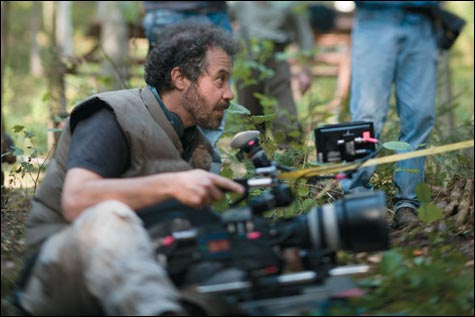
Ed Zwick |
On January 16, director Ed Zwick's Defiance storms theaters with its harrowing tale of the freedom-fighting Bielski brothers, who retreat to the forests of Belarus to protect an ever-growing brigade of Jewish refugees and wage relentless guerilla war against the Nazis. At last month's sneak-peek screening of Defiance at the Brattle (an event organized by Zwick and his alma mater, Harvard), the Oscar-winning director had this to say of Hollywood: "We are in the hero business; we usually invent them." But as fantastic as his latest film's story may be, his inspiration was plucked straight from the headlines — specifically, the New York Times' 1995 obituary of Zus Bielski, whose remarkable life illuminated an aspect of the Holocaust often overlooked in cinema: the Jews who fought back. Last month, I sat down with Zwick to talk about his new film.
I really appreciate being able to screen the movie at the Brattle. So that was an event you put together?
Well, I still have a lot of friendships among the faculty at Harvard, and my son is a graduating senior, and he had some friends there, so I thought this would be a nice excuse. Not to mention that the Brattle Theatre was a very important place to me when I was learning about movies.
Did you go there a lot as an undergrad?
Yeah, absolutely.
Does any Brattle programming particularly stick out in your mind?
Well, I probably first saw Casablanca there — I think everyone probably has seen Casablanca there — and Seven Samurai and Bergman movies. There were a lot of great films. They had the Janus catalog there, so there were a lot of films to be seen.
Do you like to premiere your work in Cambridge when you can?
Premiere?
Well, I remember reading you had premiered — at least premiered in Boston —The Last Samurai.
I think I brought it here. Yeah, I brought it to a class here. There was a professor here doing a class on samurai. Listen, it's a place that's been important to me intellectually and in terms of rich relationships, so it's great to come.
What was it like to film in Lithuania?
We were in Vilnius. And it's an unhappy place, I would say. It's a place that was traumatized before the war, by what they did in the war, and what was done to them after the war by the Soviets. Out of a population of 2.5 million, 300,000 were killed right away, and then 500,000 more over the course of 10 years, taken to the Gulag. And then once independence came, 500,000 more left to go to the EU, so it's a place that's not yet fully recovered. It's beginning to recover economically, but spiritually, I think it has a ways to go.
Do you think that what the Bielski brothers aided by geography?
Of course. How could it have happened in urban situations? They tried, as with the sewersof the Warsaw ghetto. But it was well nigh impossible. It's in fact often in rural settings that rebellion has found its greater ease. Think of Vietnam. Things like the Intifada or the Sunni resistance now is not — those people are not being faced with extermination. They're rebelling an occupier, but they're not being targeted with death. So there's a very important distinction to be made.
Thematically, this must have been an intensely personal movie for you to film.
You know, obviously, as a kid growing up, one's relationship to the Holocaust is very particular if you had any family that might have been lost or you knew families or people who were survivors, and I had all those various coordinates. But also the movie asks, in its implicit way: What would you do if you were there, and who would you be there? And it also meditates on the nature of leadership and what that means. So it's one thing to read about the Holocaust, and it's quite another to go to the places and feel its magnitude. It's very hard to wrap your mind around that intellectually.
The film sets up a few paradoxes, but what was really interesting to me was how these people need to rebel in order to survive, and yet they need to follow a leader in order to survive, or else their community will collapse.
Mmm-hmm. And they have to become rougher and more violent, even as they are the victims of violence.
Yeah, that scene where the German guard is brought into the Bielskis' camp [and is brutally beaten by the Jewish refugees] — on the one hand, it feels so justified, and on the other hand, you can see a bit of the people's humanity just falling away.
That's right.
It actually had a veryLord of the Flies vibe to me in some ways.
That's funny. You know, someone else said that. I don't really remember the movie, although I think Peter Brook directed it, didn't he? Maybe. But I was actually remembering a Shirley Jackson short story called "The Lottery."